Related Research Articles
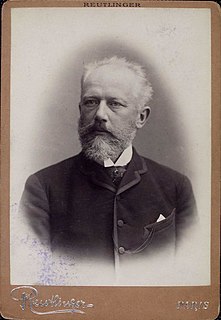
Pyotr Ilyich Tchaikovsky was a Russian composer of the Romantic period. He was the first Russian composer whose music would make a lasting impression internationally. He wrote some of the most popular concert and theatrical music in the current classical repertoire, including the ballets Swan Lake and The Nutcracker, the 1812 Overture, his First Piano Concerto, Violin Concerto, the Romeo and Juliet Overture-Fantasy, several symphonies, and the opera Eugene Onegin.

Anton Grigoryevich Rubinstein was a Russian pianist, composer and conductor who became a pivotal figure in Russian culture when he founded the Saint Petersburg Conservatory. He was the elder brother of Nikolai Rubinstein, who founded the Moscow Conservatory.
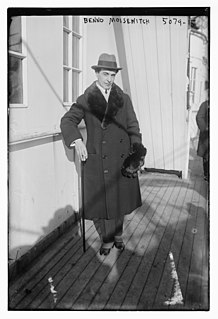
Benno Moiseiwitsch CBE was a Russian-born British pianist.
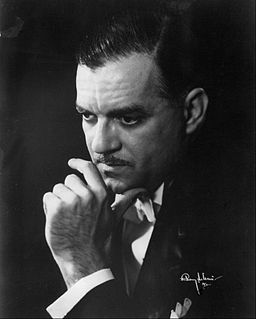
Jorge Bolet was a Cuban-born American virtuoso pianist and teacher. Among his teachers were Leopold Godowsky, and Moriz Rosenthal – the latter an outstanding pupil of Franz Liszt.
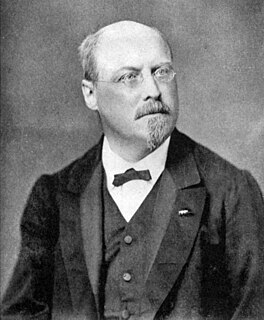
Joseph Joachim Raff was a German-Swiss composer, pedagogue and pianist.
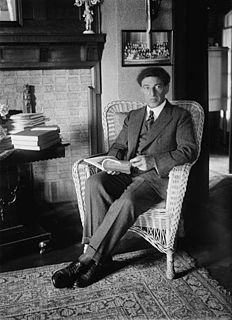
Josef Lhévinne was a Russian pianist and piano teacher. Lhévinne wrote a short book in 1924 that is considered a classic: Basic Principles in Pianoforte Playing. Asked how to say his name, he told The Literary Digest it was lay-VEEN.

Josef Casimir Hofmann was a Polish-American pianist, composer, music teacher, and inventor.

Moriz Rosenthal was a Polish pianist and composer. He was an outstanding pupil of Franz Liszt and a friend and colleague of some of the greatest musicians of his age, including Johannes Brahms, Johann Strauss, Anton Rubinstein, Hans von Bülow, Camille Saint-Saëns, Jules Massenet and Isaac Albéniz.
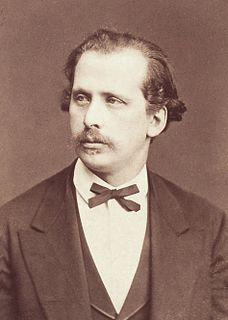
Nikolai Grigoryevich Rubinstein was a Russian pianist, conductor, and composer. He was the younger brother of Anton Rubinstein and a close friend of Pyotr Ilyich Tchaikovsky.
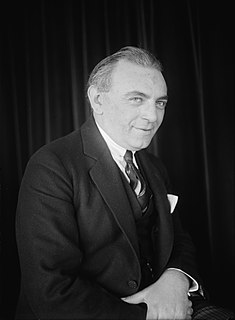
Ignaz Friedman was a Polish pianist and composer. Critics and colleagues alike placed him among the supreme piano virtuosi of his day, alongside Leopold Godowsky, Moriz Rosenthal, Josef Hofmann and Josef Lhévinne.

Emil Georg Conrad von Sauer was a German composer, pianist, score editor, and music (piano) teacher. He was a pupil of Franz Liszt and one of the most distinguished pianists of his generation. Josef Hofmann called von Sauer "a truly great virtuoso." Martin Krause, another Liszt pupil, called von Sauer "the legitimate heir of Liszt; he has more of his charm and geniality than any other Liszt pupil."

Max Deutsch was an Austrian-French composer, conductor, and academic teacher. He studied with Arnold Schönberg and was his assistant. Teaching at the Sorbonne and the École Normale de Musique de Paris, he influenced notable students such as Philippe Capdenat, Donald Harris, György Kurtág and Philippe Manoury.

Arthur Friedheim was a Russian-born concert pianist and composer who was one of Franz Liszt's foremost pupils. One of Friedheim's students was Rildia Bee O'Bryan Cliburn, the mother of 20th-century piano virtuoso Van Cliburn.
Gregor Benko is an American writer, lecturer, record producer, and collector-historian whose primary focus is classical piano performance documented on recordings from the Romantic Era. His work helped lay the groundwork for the "Romantic Revival," which continued on into the 21st century.
Frank Cooper is currently Research Professor Emeritus, Musicology, at the Frost School of Music, University of Miami, since retiring from his professorship in 2013, and is internationally known as the founder of the Festival of Neglected Romantic Music.
The Romantic revival in serious music arose in the 1960s after decades of relatively conservative and traditional offerings by the world’s concert presenting organizations and record companies.

Aaron Rosand was an American violinist.

The symphonic poems of the Hungarian composer Franz Liszt are a series of 13 orchestral works, numbered S.95–107. The first 12 were composed between 1848 and 1858 ; the last, Von der Wiege bis zum Grabe, followed in 1882. These works helped establish the genre of orchestral program music—compositions written to illustrate an extra-musical plan derived from a play, poem, painting or work of nature. They inspired the symphonic poems of Bedřich Smetana, Antonín Dvořák, Richard Strauss and others.

Anton Urspruch was a German composer and pedagogue who belonged to the late German Romantic era.
Eric Le Van is an American classical pianist particularly known for his interpretations of the music of Brahms and Scriabin. He is also an archivist of unusual repertoire. He has been guest soloist and recitalist in major festivals and venues in the United States and in Europe, notably the Weimar Franz Liszt Festival and the Beethovenfest in Bonn, the Fetes Romantiques de Nohant Festival in France, as well as the Kennedy Center and the Library of Congress in Washington D.C.